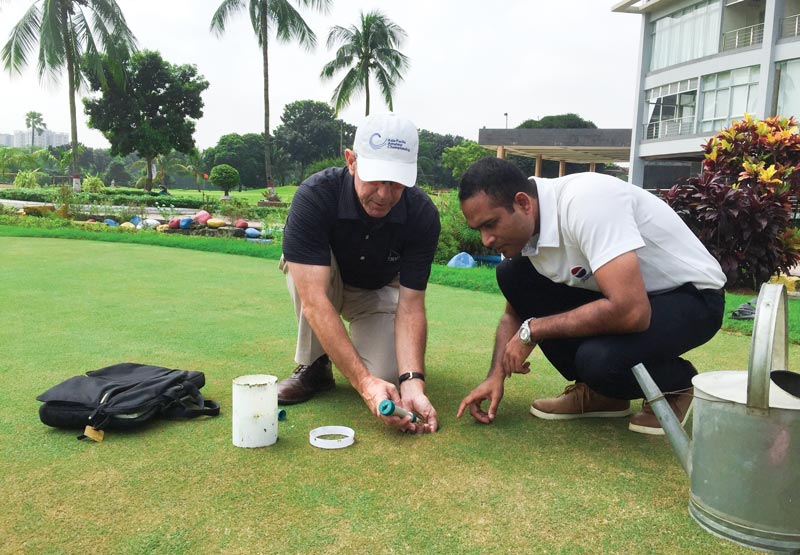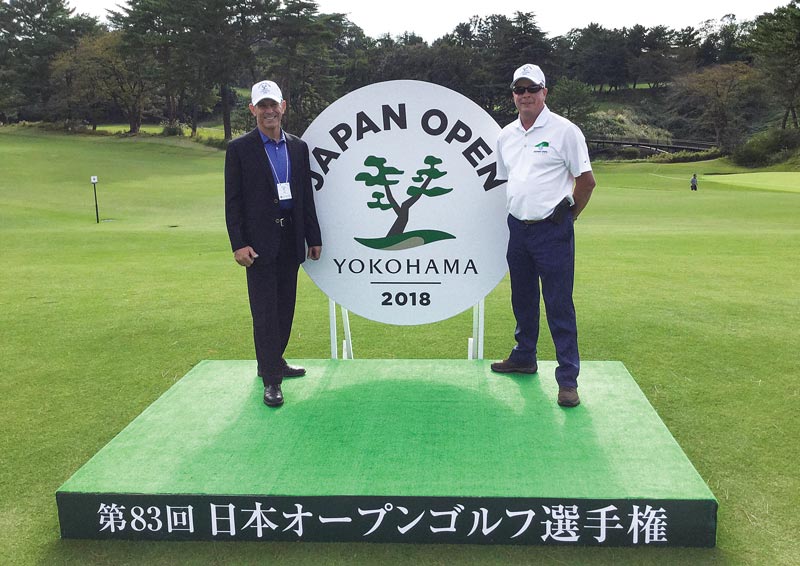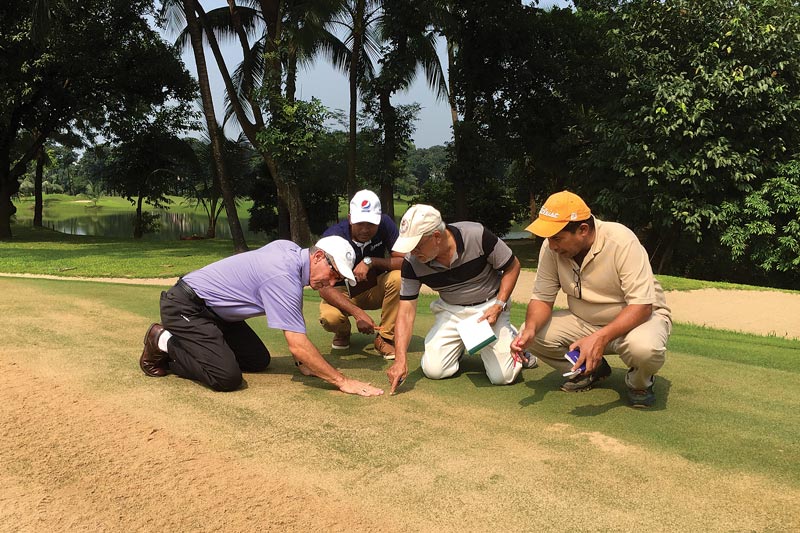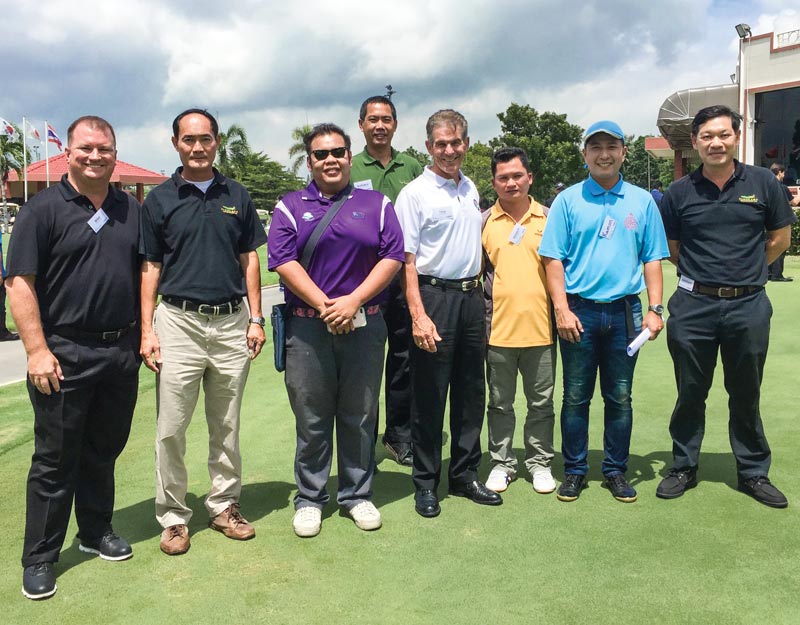
Tony Taylor (left) inspects a green at Kurmitola Golf Club in Bangladesh with course superintendent Mohammad Shameem Sarkar. The club is the site of an annual Asian Tour event. Photos courtesy of Tony Taylor
In the early ’90s, I was working as the superintendent at The Links at Spruce Creek in Summerfield, Fla., when, one day, the photo on the cover of GCM caught my eye. It was a scene from the golf course construction boom in Asia, and I learned from the article that there was a golf development upswing happening in most of Southeast Asia. In Thailand, there were more than 80 golf courses being built or in the planning stages within a roughly 200-mile radius of Bangkok, a city of over 5 million.
This fact piqued my interest, and I wondered, “Who’s going to take care of all these courses?” Little did I know that I’d soon be smack in the middle of the action.
I’d started my career as a golf course superintendent in northern Florida after graduating from Lake City Community College (now called Florida Gateway College). I did a stint in Texas for ClubCorp, and eventually settled in west-central Florida as a superintendent at Innisbrook Resort, where, from 1982 to 1985, I honed my skills in high-quality golf course maintenance.
In 1992, a friend of mine who worked at a neighboring course was offered a position for the grow-in and maintenance setup of a course in Thailand. He turned it down because he had a young family at the time, but he recommended me for the job, as I had recently completed a construction and grow-in project in Ocala, Fla. After a bit of research, discussions with my mentors and thinking back to that GCM article, I decided to take the plunge. I signed a six-month contract to work on Barrington Golf Club in Kanchanaburi, Thailand.
Twenty-six years later, I am still in Thailand, and I have also worked in Singapore, Vietnam, Cambodia, Bangladesh, Indonesia, Hong Kong, India and Japan. In those years and those countries, I was able to see many things through a new lens, including what it takes to be an effective, successful golf course superintendent. This know-how — which was often hard-won — can be put into practice by superintendents working in any part of the world. The following six lessons are those that have guided and best served me in my career.
1. Keep your eyes on the mountain
In the early years, there were no amenities for foreigners in Thailand, as tourism wasn’t yet popular in the more remote areas of the country. My accommodations were in an 800-year-old village. No fancy hotels — just the locals and myself. The only food available was from giant cooking pots in the local huts, where everyone ate together. The chili tossed into the frying pans made me cough and my eyes water. The food itself was so spicy I could hardly get through breakfast or lunch.
On more than one occasion, I found myself in a jungle hospital all night with food poisoning. Staffing the project was a challenge too, with at least half the labor force hit with malaria at one point or another. I woke up each morning dreading what I might have to face — food I could hardly eat, dengue fever, cobras, a bit of homesickness. Those first weeks were almost unbearable.
Then one day, while on a mountain overlooking holes I had just grassed, I found myself smiling, envisioning the course’s beauty and the enjoyment it would bring once we finished it. I couldn’t wait. That was probably the first real smile and sense of joy I’d felt since arriving in Thailand, and I realized then that I had allowed myself to get mired in the challenges and, in turn, had ignored that I was getting to do what I love and what I’m good at, and that my actions can produce amazing results. I had lost sight of the mountain and was seeing only the jungle.

Taylor (left) with superintendent Greg Jackson at the 2018 Japan Open at Yokohama Country Club, where Jackson handled the fine-tuning after construction.
As a golf course superintendent, if you are not working from a place of passion, any challenge — even a small one — becomes a stop. A lesson I learned early on in Asia is that if you really love what you do and can keep your eye on the mountain, you can overcome any setback. I was able to persevere following sicknesses and in the face of many other obstacles by looking outward toward my goals and purpose. Redirecting my attention this way — rather than letting the chaos of the “jungle” dominate my thoughts — allowed me to stay the course.
2. Treat others as you wish to be treated
Barrington Golf Club was a remote, private resort course, yet I often felt like I was living in a glass house, as my every action was scrutinized by people who didn’t know anything about golf or golf courses, let alone about how a professional golf course superintendent operates. This annoyed me at first, I must admit, and the annoyance came across in how I interacted with others.
One day, when I was reprimanding a staff member for not carrying out my instructions, I was taken aback by the fear I saw flash in his face. It had never been my intention to get the job done with fear as a management tool, but there I was, doing just that. I’ve had my share of tyrants as bosses, and I can vividly remember how those circumstances felt, and, more important, how they did not inspire me to do my best.
I decided in that moment to make a conscious effort to always speak to others in a way I would want to be spoken to. Although this meant that at times I had to take a deep breath and count to 10 before speaking, this personal-development exercise serves me still. The decision created a chain reaction in other, unexpected areas of my life and how I operate. For example, I no longer felt annoyed at scrutiny, but viewed it instead as interest and curiosity from those whose community and livelihoods were being impacted by my work.
By virtue of taking a little more time to explain things and to make sure I was understood — not just expecting others to understand — I became more of a mentor without really trying. I had always been proud of my skills as a superintendent, but I was now proud of how I represented my profession, as well as how I represented an American in a foreign country.

Course as classroom: Taylor (left) trains staff at Kurmitola Golf Club in Bangladesh on topdressing application rates.
Another byproduct of this resolution was that employees were more communicative and not afraid to ask me questions. They were eager to do a good job and make me proud, and they became loyal members of a team. Staff from those early years still stay in touch with me, come to me when they need jobs, and send workers my way when I need them.
All of this arose from a single decision — to treat others as I wished to be treated. The benefits have been well worth the little extra time I invested in ensuring I was understood and pausing to let any initial reaction pass on its own. And it would pass.
3. Never compromise your standards
As the construction boom in Asia continued, there was so much work that I eventually started my own company, Quality Golf. I hired other foreign superintendents along with turf managers who had found their way to Thailand and other parts of Southeast Asia on their own. As is inherent in our profession, a community formed in which all of us would share experiences, challenges and ideas.
From these relationships, I learned another invaluable lesson: Despite the often steep learning curve that comes with being a superintendent — especially in a foreign country — we must never compromise our standards. Those superintendents who leaned on their education and experience and never wavered on their standards of excellence are the ones who are still doing well in Asia today.
Several parties — owners, committee members, staff — rely on the superintendent’s ability to deliver, and one project can color a superintendent’s entire reputation. Always holding ourselves to the highest standard is thus in others’ and our own best interests.
One of my first jobs in Asia, Panorama Golf Club in Nakhon Ratchasima, Thailand, still stands the test of time. The greens are considered the best in the area, the course hosts many Thai PGA Tour and Thai Senior Tour events annually, and the original superintendent I trained is still there. And not compromising your standards extends beyond agronomy: From the beginning of my time abroad, I was known for professionalism, and that has kept me working in this part of the world for more than a quarter-century.
4. Never stop improving yourself
I received the offer to oversee the planting and maintenance setup of Panorama GC almost simultaneously with the completion of Barrington GC. I was feeling confident and excited to put everything I’d already learned abroad into practice. And because Panorama GC was closer to a city, I thought the experience would be more like what I’d been used to in the U.S. Nothing could have been further from the truth, however.

The par-3 second hole at Panorama Golf Club in Nakhon Ratchasima, Thailand. The planting and maintenance setup of the 18-hole course was among superintendent Tony Taylor’s first jobs in Asia. He returned to work at the club as senior superintendent in 2009.
At the new site, many staff members had prior training from others. Some of the training was sound, but some of it was actually detrimental to the project. On my first day back after a vacation, I was up at dawn to survey the course, and as I walked out on the first tee, I noticed it looked quite different. The turf was too high. I peered down the fairway, and my heart sank. All the definition between the fairway and rough was gone. I was dumbstruck.
Just then, my assistant came riding up to me with a big grin on his face. Baffled, I asked why the grass was so tall on the tees, fairways, rough and greens. He replied that rain had prevented mowing for a week, and when the crew had started to mow again, it was scalping the turf, turning it yellow and brown. The general manager had told the crew just to stop mowing until I returned.
I took my deep breath as I’d resolved to do, but my reply still came out too forcefully. My assistant’s smile vanished, and, because of my tone, I lost his attention. I then had to take the time to bring him back to a point where he was willing or perhaps able to listen to me. I had made a bad situation worse.
The lesson is this: Even after we’ve made strides toward bettering ourselves, it is continuous work to apply what we’ve learned. Superintendents must recognize this and be committed to continuing to improve, always acknowledging our weaknesses so as to keep improving. Our on-the-job development is not a journey with an end. After all, we are in a rather unpredictable line of work, dealing with acres of land, the fickle moods of Mother Nature and the fluctuating emotions of people. We must be able to manage them all, and this requires not slipping into autopilot, and being open to confronting any situation that may arise so we can provide education that will prevent it from happening again.
5. When working with a team, be in present time
Trying to get staff in Asia to do things “American style” or “Tony’s way” was impossible. I was not in America, and the people I was working with were not American. I had to open my eyes and see who they were, and that meant embracing their culture.
I discovered that Thai is a very formal, polite language, with speakers addressing every person as Mr. or Mrs. I began using names respectfully, the way the citizens would with each other, and I learned some other basic practices and courtesies. These simple actions went over extremely well and opened the door to greater communication and cooperation. This wasn’t difficult, and was actually more of a pleasure than a burden. (I’ve since become fluent in spoken Thai, taking lessons and practicing with my staff and the locals. Being able to speak to people in their own language has not only made doing my job easier, but it has helped me earn their respect.)

A turf community: Taylor (center, white shirt) and peers at a Thai superintendent seminar at Green Valley Country Club in Bangkok in 2017. Among those photographed are superintendents who currently work for or were placed by Taylor, including Brian Distel (far left), superintendent at Thai Country Club near Bangkok. Taylor recruited Distel from the United States to work in Asia 10 years ago.
The ability to adjust to one’s setting is a skill every superintendent working in a foreign country must possess, but I think it’s just as essential for superintendents working in the States. Though our industry has “standard” ways of doing certain things, each course has its own personality that’s a product of its leadership and the team that cares for it.
When getting started at a new course or on a new project, be in present time — don’t compare people or procedures with how things were done “on my last job” or “in America.” There is nothing more off-putting to a new team than being compared to an old team. Several fellow Americans made this mistake in Asia and were not so well received. Let your past experiences inform your work, and communicate these insights clearly and respectfully, but also be open to learning from those who have a history with any site that’s new to you.
6. Defeat ‘fixed ideas’ through training
We’ve all run into this obstacle: the preconceived idea. Or, as I like to call it, the “fixed idea.” This is especially prevalent abroad, and I’ve seen it take many forms, from “We’ve always done it this way” to “Yes, sir.” Such situations are no doubt frustrating, but responding from frustration — taking a “my way or the highway” approach — isn’t constructive and doesn’t inspire cooperation.
After years of encountering this issue, I’ve learned the solution boils down to training, training and more training. You must take full ownership of and responsibility for your team’s understanding. This is also important in dealing with industry leaders, owners, members or longtime employees whose cooperation you need to achieve a result. I’ve found a simple balance of theory and practice helps the trainer get the most from the trainee:
- Provide enough of the theory behind why a particular task is done.
- Speak to employees at a level they can understand, without using terminology they perhaps didn’t have the opportunity to study like you did. (You see this at universities where lecturers speak at their level and not to that of the students — a fast way to lose an audience to their phones or a nap.)
- Use diagrams, photos and other visuals to aid comprehension.
- Balance information with practice. After you’re sure your staff understands the theory behind a task, take them out to the course for practical application.
- Create an environment that nurtures learning and welcomes questions.
It takes a great deal of patience to train people this way, but the payoff is substantial. I once did a series of irrigation workshops at a course in India, and after the third training — during which I’d used plenty of visuals and taken the team out on the course to apply what they’d learned — one of the staff members approached me. He told me he was a third-generation waterman — both his grandfather and father had worked at the club. “But this is the first time anyone has ever told us this so clearly!” he announced. The look on his face was priceless, and from then on, he was one of my most trusted and valuable employees.
For me, preparing sporting fields for the game of golf for people of all walks of life is an honor. I hope these lessons can help you avoid or better navigate a few challenges, enhance your career, and find sustained success. Golf course maintenance can be a passion of a lifetime, and it has been mine.
Tony Taylor, CGCS, has been the executive director of Quality Golf in Thailand since 1994, and he is the senior superintendent at Panorama Golf Club in Nakhon Ratchasima, Thailand. A 28-year GCSAA member, Tony has been the senior consultant superintendent for more than 20 televised golf tournaments throughout Southeast Asia, India and Japan. He has placed 18 superintendents in Asia over his 26-year tenure there. Tony grew up on a golf course, starting as a caddie in Pittsburgh. He graduated from Lake City (Fla.) Community College with a degree in golf course operations in 1977.